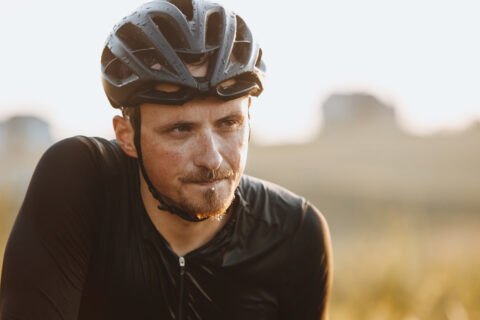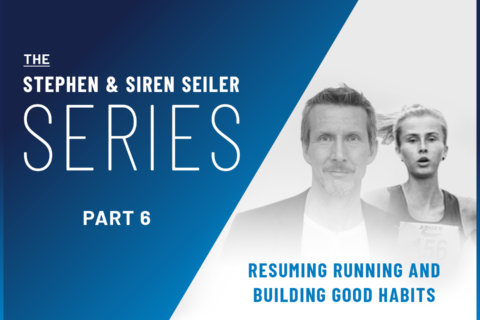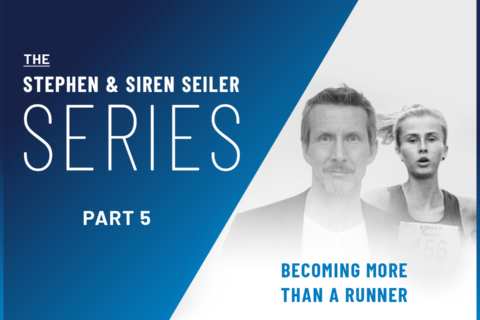Coach Grant Holicky reveals how to stay focused and concentrated. It’s all about knowing what is relevant to your goal.
Video Transcript
Chris Case 00:00
Hey everyone, I’m Chris Case here with Grant Holicky of Forever Endurance. We’re talking focus and concentration today.
Grant Holicky 00:06
For a lot of athletes, the idea of how to keep their focus and how to really be concentrated on the goal at hand is incredibly important. Whether we’re training or whether we’re racing, how we’re going to dial in on what matters is what’s going to sell us on our success at the end of the race.
Chris Case 00:22
Excellent. Let’s dive in.
Chris Case 00:34
Welcome to Fast Talk Laboratories, your source for the science of endurance performance.
Chris Case 00:44
Alright, strangely enough, I think we’re going to talk about Jerry Seinfeld.
Dialing In on What Really Matters
Grant Holicky 00:47
Yeah, he has a great quote, and the quote goes, “when you’re swimming in the water, doesn’t really matter how deep the water is, all you can do is swim.” That’s basically the gist of what we’re talking about here with concentration and focus when it comes to sport. In other words, there’s a whole lot going on out there, you have an assault on all your senses, whether it’s smell, taste, sight, feel, everything, there’s all this going on, and when you’re at the start line, or even when you’re training, one of the most important things you can do is dial in on what really matters. What of those things that you’re being bombarded with right now matter? One of those things that you’re being bombarded with is going to actually influence your chance to be successful in that race or that training session.
Chris Case 01:34
And that’s a shortlist.
Visualization
Grant Holicky 01:35
Yeah, that is a shortlist. This is a great way to kind of experience this, and we’ll talk about visualization a couple of times today, but give yourself a moment and slow everything down, close your eyes, open your eyes, doesn’t really matter, but visualize yourself at the start of whatever competition you’re about to do, and just bring everything in. For myself at a cross race that might be the smell of the air, that might be how bright it is outside, that might be the course, that might be the smell of the taco truck that’s in the infield, all of those things, the sounds, the people, that kind of information, we want to visualize that as we’re thinking about the start of a race. Far too many people want to see it as this perfect scenario, and it’s only us, and it’s this tunnel vision, that’s not really what it is. Then we get to that start line and everything’s there. We get to race, and you may have sponsors to deal with, you may have friends that you haven’t seen in two months, how do you sort through all of that information and then dial in and drill down to what matters to you today?
Chris Case 02:47
What’s that process look like?
Identifying Controllables and Non-Controllables
Grant Holicky 02:48
Well, I think the most important thing, like we said, is to identify what matters first. What I’ll say to athletes a lot of times is, what are your controllables and what are your non-controllables? You can control your warm-up, you can control your routine, and we’ll talk a little bit about routine later, but you can control all of these factors, but there are all these factors that you can’t control, you can’t control who shows up to the race, you can’t control the weather, as much as we’d love to, you can’t control the conditions, you can’t control any of these things. So, really trying to eliminate those non-controllables from your mind and the only way you’re going to be able to do that is not by trying to portion them out, you can’t push those out of your mind, they’re always going to find a way back in, but what you have to do is these are the things that matter right now, these are the things that I can concentrate on, I can concentrate on my warm-up, I can concentrate on hitting my number on in time, I can concentrate on getting the line at the right time. The more you can dial in and drill down to those pieces, the more you’re going to be able to force those other pieces out of the picture.
Chris Case 04:00
So, you’re bringing the relevant material to the forefront, and the other stuff sort of naturally subsides?
Grant Holicky 04:07
Yeah, you’re not going to have time almost, right? For lack of a better way to put it, we can have all these doubts, all these concerns, all these worries, I’m terrible in the mud, or I’m great in the mud, or I’m bad in the dry, whatever that is, make this tire selection, pre-ride the course, do the things that you need to do, make sure you have the food for the weather and all that, that’s what pushes those other non-controlables out of the frame and allows you to be focused on the things that matter.
Chris Case 04:33
Very good.
Grant Holicky 04:34
Yeah. Moving forward from that becomes having that idea of a routine.
Chris Case 04:41
Mm-hmm.
Routine vs. Superstition
Grant Holicky 04:42
That becomes important to people. I think we’ve touched base on this in past episodes before, but the idea of a routine versus superstition, right? So, superstition is I have to do everything the exact same way.
Chris Case 04:54
Or else.
Grant Holicky 04:54
Or else, right? And as soon as you miss a step the whole world caves in, and it hasn’t, you just missed the step, right? Routine is this idea of this is my list of things that I have to get done, this is the timeframe that I have to get them done within, this is how I do that, this is when I eat, this is when I get on the trainer, this is when I pin my number, this is when I go to the line, all of those things. So, even if the timeframe changes, as you and I both well know with kids and families, you might get to the line 30-minutes later, you might get the course rather 30-minutes later than you want to, how does that routine then get compressed? Okay, I know what I’m going to do. So, having that plan, having that idea, having that approach is going to be able to give you something to focus on, give you something dial in on, and it pushes all those other things to the outside.
Chris Case 05:48
Right. It becomes choices that you make, rather than almost this attitude that it’s fate.
Grant Holicky 05:54
Yeah. I think that’s something that I will always preach to athletes, you have a large degree of control over your outcome. It’s one of my complaints about the sport of cycling, is that there’s this idea of bad legs, I had the bad legs, you know, we can joke all we want about some of the Belgian or Dutch quips, but bad legs is one of those quips and you hear athletes say it. Well, “What was wrong?” Oh, “I had the bad legs” and “what are the bad legs?” “I had the bad sensations.” That is this idea that something did this to me almost, right? I didn’t do it to myself, it did this to me, there was nothing I could do.
Chris Case 05:54
I was a victim.
Grant Holicky 06:32
There you go. I had no control. So, this idea of how do I establish control? How do I go after those things that I can do something about? Hey, man, if you go to line and your legs don’t feel great, your legs don’t feel great, you still have to race the race, and you start to step up and do that. So, that idea of exactly as you’re saying, you know, focus in on what matters and control your situation, routine is going to allow you to continue to do that.
Chris Case 07:01
Very good. All right, so big question, how do we actually get better at this focus- concentration, focusing on what matters, all these things?
How Do We Get Better at Focus and Concentration?
Grant Holicky 07:09
Right. So, one of the most important things we can remember here when we’re talking about focus and concentration is that concentration and focus our choice, first and foremost. It’s a skill and it’s a trainable skill, just like all the other things that we’re going to talk about, and so much of the things that we’re talking about in this mental strength series, we have to remember they’re trainable. We have to remember we can practice them and we can improve on those things.
Chris Case 07:33
These videos are a starting point.
Grant Holicky 07:35
Yeah.
Chris Case 07:36
You have to do homework, you have to go out as an athlete and do more work, you can’t just watch grant speak for five minutes and get it, there’s work to be done.
Grant Holicky 07:44
I wish that was the solution because I would become a lot more important than I actually am. The reality is, yeah, they’re just like anything else, you know, you can’t go out and do one sprint session or hear somebody talk about sprinting, and suddenly you’re Mark Cavendish, right? You have to be able to go out in the world and train this, it takes repetition, it takes consistency, it takes commitment to it. So, one of the things that I like to talk about a lot is, you’re not just going to turn this on when the time comes. So, you have to be able to do this in a training session, you have to be able to walk out the door with a wife and a daughter, or wife and two young boys and put away that or put away the job, and then think about today I’m going to train, and this is what my goal is when I’m training. So, that choice to buy in, focus on what you can, what matters, and then that second thing is to do it with regularity, right? Put yourself in this situation over and over again, where you’re making that choice, and you’re getting better and better at that choice.
Chris Case 08:48
And compartmentalizing to some degree as well.
The Idea of Mindfulness
Grant Holicky 08:50
Absolutely. One of the things that I like to talk about that helps with this is the idea of mindfulness. The idea of mindfulness says, “be here right now,” is the essentialness of it, right? Where are you? I’m right here. When are you? I’m right now. You can’t do anything about what’s past, you can’t do anything about necessarily what’s coming, you can do something about right now. For so many of you that were talking to with this that have jobs, that have families, that have that kind of lifestyle, how do you transition from one thing to the other? We find ourselves so often rushing from family commitment to the bike, or from job commitment to a race, how do I give myself that? Maybe just takes five minutes, that little bit of time to go, Alright, what am I holding on to? Okay, I’m going to leave that for a couple minutes, and now I’m going to go do this. So many of us look to our trainer exercise and our racing as a release.
Chris Case 09:49
Therapy.
Grant Holicky 09:50
Yeah, absolutely. And so quickly, it can become another thing in our day that we have to do, and we’re carrying one piece to the next piece, to the next piece, to the next piece.
Chris Case 10:01
That sounds stressful, and you don’t want that.
Grant Holicky 10:04
It’s hard, and before you know it, the thing that you enjoy, and the thing that you really, really love becomes another piece of this list in the day that you have to get done.
Chris Case 10:13
Right.
Grant Holicky 10:14
So, that idea of mindfulness, take a moment, understand where you are, and then step into a focused, concentrated moment on your training. That’s really the thing I want to leave everybody with is that you can choose to buy in and leave some of those other things behind and really be in the moment, and you never get those moments back. One of the things that I’ll always remind athletes of is, you will never get this moment back, whether it’s successful, whether it’s a failure, whether it’s a disaster, whether it’s joyous, and whether it’s depressing, that is part of life, and you’ll never get that back. So, buy into it completely.
Chris Case 10:58
Very good. Well, great words of wisdom to end on there. Thank you, Grant.
Grant Holicky 11:02
Yeah. Absolutely
Chris Case 11:04
How should people get in touch with you or continue this conversation about focus and concentration?
Grant Holicky 11:09
Reach out on the forum and touch base, one of the things we’d love to hear about is how are you doing on this process and where are you on this journey? So, tell us about how you’re building your concentration in your training or in your racing, how you dial in on your focus? We really love to hear those things from you guys, and we can all learn from each other doing that.
Chris Case 11:28
Absolutely. Thanks again for joining us here at Fast Talk Laboratories.



